In the West, we live in a time of steadily increasing hostility towards Christianity. Famously, the late and much missed Cardinal George of the Archdiocese of Chicago, who died of cancer in 2015, summed up the situation with the following statement made several years before his death:
I expect to die in my bed, my successor will die in prison and his successor will die a martyr in the public square.
This statement caught attention at the time, but it is not quite as pessimistic a statement as some have suggested. Clearly, there is an assumption here that his successors would be as orthodox in their faith as he was in his, and so merit attack from secular forces. (Some might argue, when considering his successor, that he was being overly optimistic in this regard). Nevertheless, he went on to say in the same statement, that after the death of the martyr bishop:
His [the martyr’s] successor will pick up the shards of a ruined society and slowly help rebuild civilization, as the church has done so often in human history.
In other words, we should not lose heart, for the Church will prevail regardless of the malice of men or the devil.
I thought about this when I heard a homily about the need to bear witness to the Faith today. The pastor made the point that while we are not at the point yet of being persecuted for our faith in this country, it might happen in the future and it is more likely to happen if we do not stand up for the Faith now. Countering prejudice at an early stage, he suggested, can help to stop it growing into open hatred and persecution in the future. He reminded us of how blessed we are in this country, still, compared with many who event today live in real fear for their lives for practising their faith, especially those in some predominantly Islamic countries.
I pray that if required, I might have the courage of the martyrs through the centuries who stood up to oppression whether it be from Boko Harum or the Emporer Diocletian.
In the meantime, the question is what can I do here and now to play my part? How do I bear witness in such as way that people know that I am a Christian and is likely to create a positive enough impression to draw people to the Faith?
The first thing, I think, is to acknowledge my need for God’s grace to be able even to begin to live up to Christian ideals by being a good Christian and demonstrating the ‘art of being happy’.as Pope Benedict XVI wrote:
Human life cannot be realized by itself. Our life is an open question, an incomplete project, still to be brought to fruition and realized. Each man’s fundamental question is: How will this be realized—becoming man? How does one learn the art of living? Which is the path toward happiness? To evangelize means: to show this path—to teach the art of living. At the beginning of his public life Jesus says: I have come to evangelize the poor (Luke 4:18); this means: I have the response to your fundamental question; I will show you the path of life, the path toward happiness—rather: I am that path.
(The New Evangelization, Building the Civilization of Love, Address to Catechists and Religion Teachers, December 12, 2000.)
We show people this path by being joyous and virtuous people who openly acknowledge that it is through Christ that we have such a life. I do my best follow the life of a Christian and the spiritual exercises known as The Vision for You are a daily aid in my life to living joyfully as a faithful Christian, even through hardship.
Second is to look for opportunities to let people know that I am a Christian. If hear derogatory remarks about Christians and Christianity, I try to respond in a matter-of-fact way and cheerfully that I am Christian. Usually no more than that. Typically this has the simple effect of halting the conversation because no longer is ‘the Christian’ an abstraction in their imaginations, he is a real person. Most people shy away from directly offending flesh-and-blood people standing in front of them as it is always easier to be rude about people who aren’t there. My hope in this is that their impression of me as a person doesn’t correspond to the charicature of Christians they just presented (and more often that not the derogatory comments are innaccurate charicature) and this will open up curiosity.
My third response was to do something a little different. I try to show people I am a Christian without having to say anything. If I am casually dressed, I wear a cross around my neck, which is small but visible.
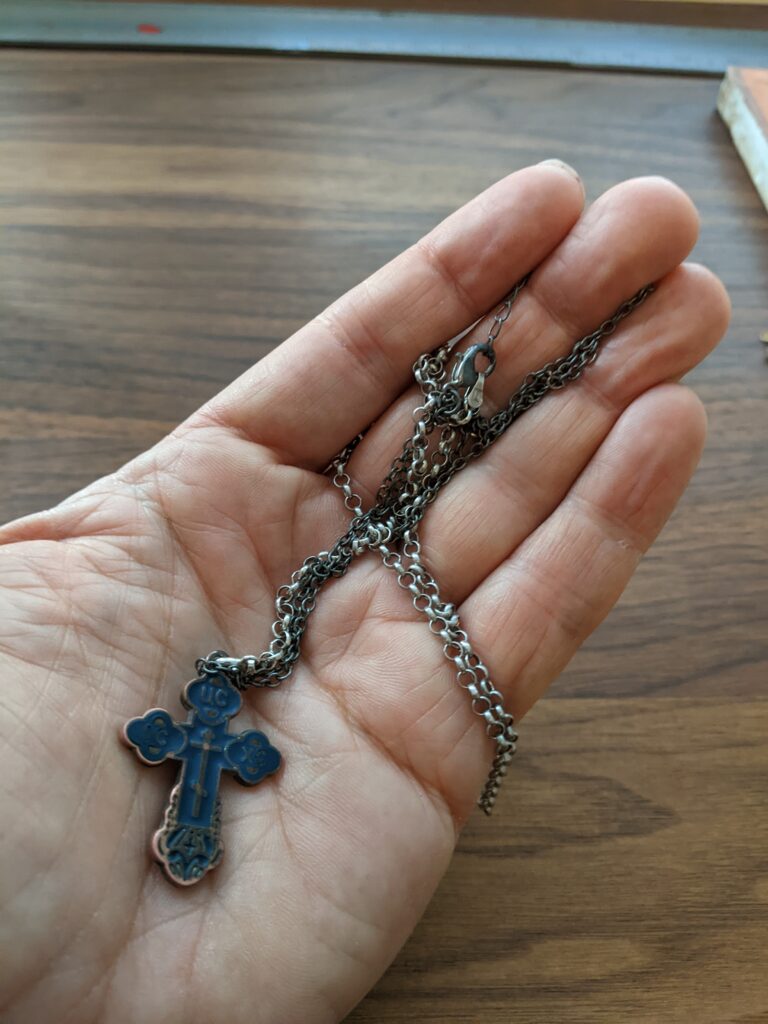
If I am wearing a jacket I wear a lapel pin with the Holy Face of Christ. I had to make these myself. I found a company online that makes personalized lapel pins and so asked them to create some for me based on the Holy Face. I sent them a jpeg of the following icon:
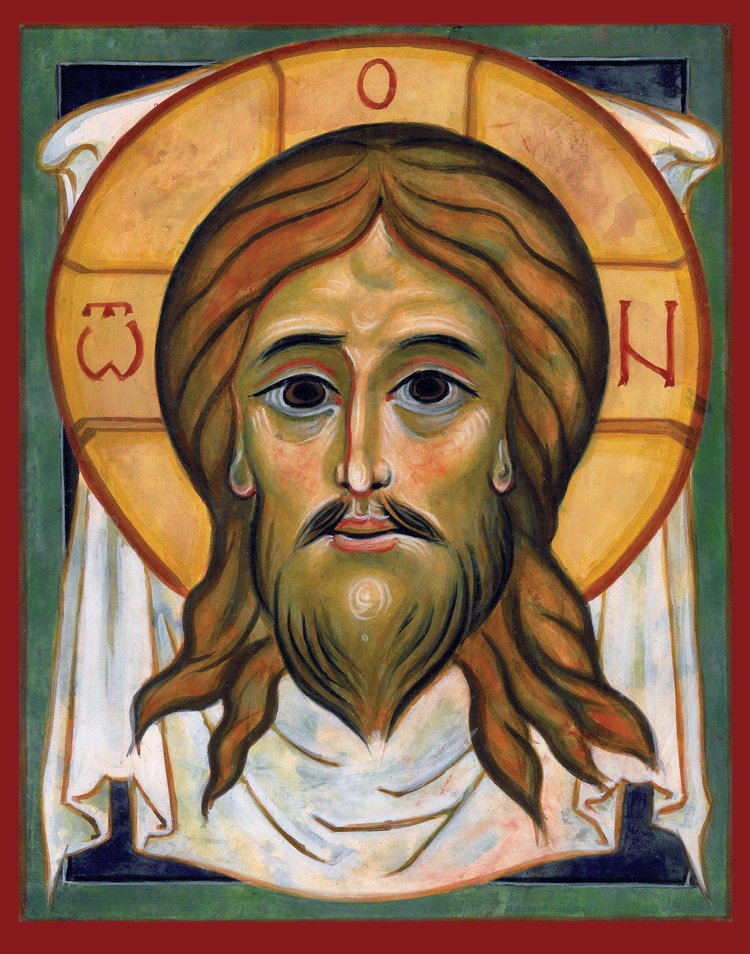
When the batch came (I had to order 100) they looked like this:
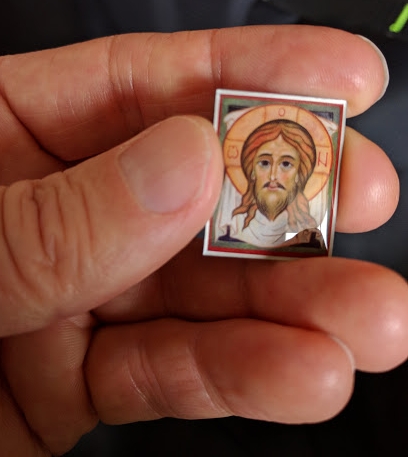
Already, people have asked about it, and one even asked where I go to church. I also see many people looking at it when I wear it although most do not say anything. Nevertheless, I am pleased about this because I feel that I have made a statement without saying anything in a way that I feel comfortable with. One person asked me who it was!
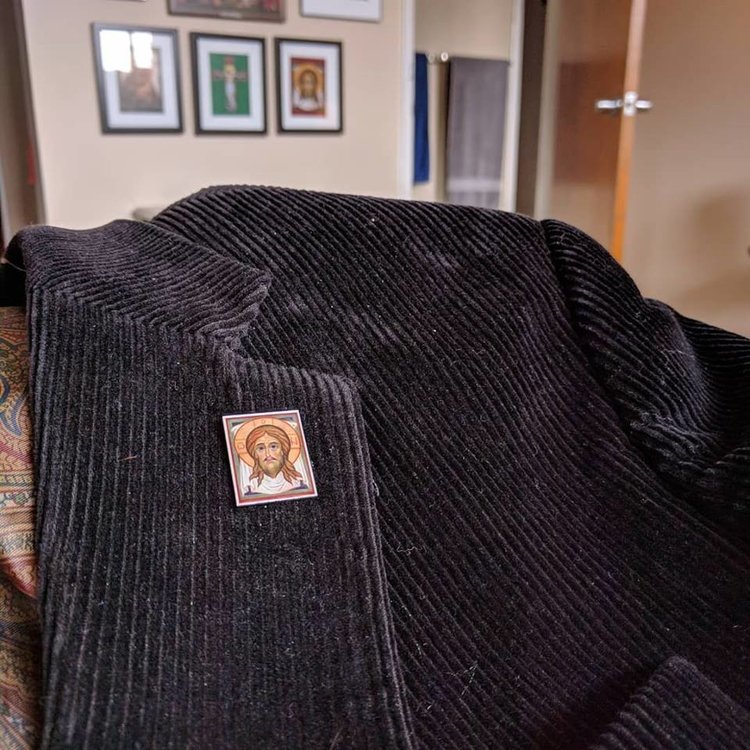
If I am committing to make a visual statement that I am a Christian like this, then it does mean that people are going to judge the good Christianity by the sort of person that I am. I pray to God that I can live up to the ideal of cheerful virtue that is asked of me.
I might be wrong, but I don’t feel I am the sort whose natural gifts extend to being able to attract people to the Faith by standing on a soapbox and preaching on a street corner to passers-by; or by wearing a sandwich board that says: ‘The End is Nigh’ – as a man used to do for years in Liverpool city center when I was growing up in the 1960s and 70s.
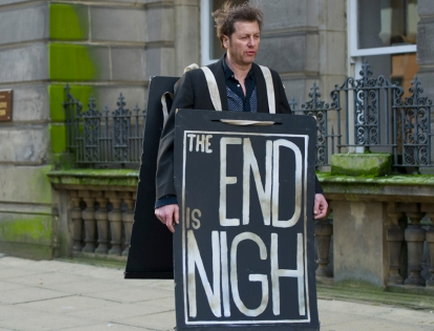
A lapel pin is my way of being in-your-face with the Holy Face, while not looking as though that’s what I’m trying to do! The end is indeed nigh for all of us, but there are different ways to make that known!
From the Benedict XVI | Conversion | Cupich | David Clayton | evangelization | New Evangelization | Sacred Art series
View more Posts